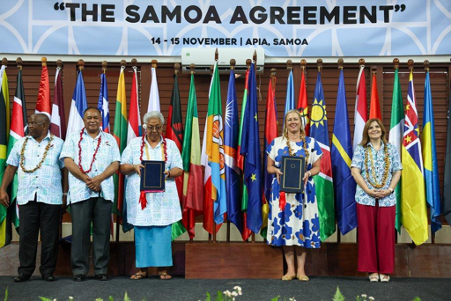Guyana and Trinidad and Tobago are among five countries in the region that have yet to sign the controversial EU/OACPS Samoa Agreement, which is the successor to the Cotonou Agreement that the Organisation of African, Caribbean, and Pacific Group of States (OACPS) has with the European Union (EU).
Other Caribbean countries that are yet to sign are Saint Lucia, Cuba, and Dominica. A combined total of 15 countries have withheld their signatures from the agreement, which is now being provisionally applied. The agreement is the legal framework for the EU’s engagement with 79 countries from the African, Caribbean, and Pacific regions on matters concerning aid and development assistance.
“At this moment, 64 countries have signed. Until now, Guyana has not yet done that, but we have very positive indications that Guyana will favourably sign,” EU Ambassador to Guyana, René van Nesvan Nes said during a recent press conference when asked for an update.
“They had some concerns, and it is good that they take their time and look at that, and they sign things only when they are comfortable. So we are talking about those issues that they would like clarified. And I am quite positive that that indeed will lead into a signature of Guyana,” he was reported as saying by Stabroek News.
The Samoa Agreement is a transition from the Cotonou Partnership Agreement, which ended on December 31, 2023. On November 15, 2023, the EU and several member states signed the new partnership agreement in Samoa. The agreement is based on six key priorities, such as human rights, democracy, and governance; peace and security; human and social development; inclusive, sustainable economic growth and development; environmental sustainability and climate change; and migration and mobility.
Jamaica was among the first in the Caribbean to raise objections to the signing of the agreement and did not officially sign until mid-December. Christian advocacy group, the Jamaica Coalition for a Healthy Society (JCHS), raised objections for several reasons.
“The agreement will bind Jamaica to undefined human rights obligations tied to trade sanctions, reintroduce Comprehensive Sexuality Education (CSE) back into schools despite parents’ outrage in 2012 with regards to CSE’s sexualizing content, trap the nation in yet-to-be-negotiated international instruments, and demand the acceptance of terms that directly threaten citizens’ freedom of conscience and speech,” the JCHS said at the time in a press release.
Despite the reservations, Foreign Affairs Minister Kamina Johnson Smith said the decision to sign was taken in the interest of the country’s development goals and its partnership arrangements with fellow OACPS countries and the EU. She says the decision was also taken in the context of Jamaica’s close involvement in the negotiating process, which lasted over two years.
The church community in Trinidad and Tobago also encouraged the government not to sign. Trinidadian Catholic Archbishop Jason Gordon is among those that had issues with the agreement.
“They will have to impose abortion legislation, transgender, LBGTQ, comprehensive sex education, a whole range of values will be imposed because of the signing of that document. The EU is imposing upon us an ideology that is not ours and a value system that is not ours. And if we don’t understand and wake up and smell the coffee quickly, we will find ourselves with values, with laws, with expectations, and with things being touted as right that has nothing to do with us Caribbean people,” he said at the time.


